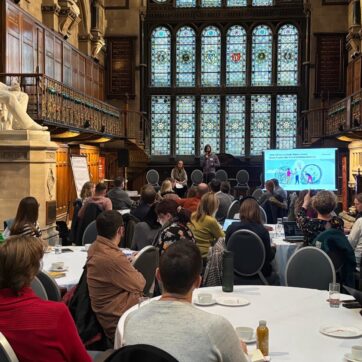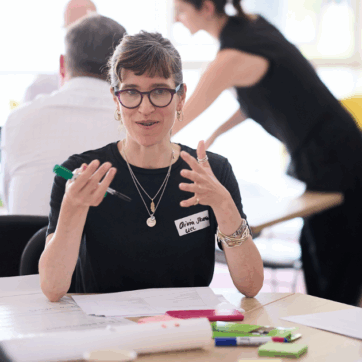When we think of the current research-policy ecosystem in the UK, what image does it conjure?
Some may picture an archipelago. Whilst this group of islands occupy the same territory and may look alike, each island supports different communities and cultures, and each are separated by the surrounding waters.(1)
In the context of our research-policy engagement ecosystem, each island represents a research-policy engagement initiative. They look alike in the sense that they are seeking to achieve the same goal: trying to understand what works in research-policy engagement, but their culture, processes and tools to achieve this look different from one another.
But what if we could better connect our islands so that resources can be shared and communities are better able to learn from one another? Would this allow a deeper understanding of what works in different contexts, whilst avoiding unnecessary duplication? Could we help our islands thrive through greater collaboration, whilst retaining distinctive individual values and approaches?
The research-policy ecosystem is rapidly evolving – and for good reason. It’s a rich system, as described by Hopkins et al., in their report ‘Science Advice in the UK’. Whilst the success of the research-policy ecosystem is down to the way its adapts and evolves, the ability to articulate well the state of this evolving ecosystem and how it should function to deliver optimal results hasn’t kept pace. The lack of an agreed framing has implications especially when considering the interconnectivity and sustainability of the ecosystem. How should it function as a whole and in terms of its individual components? Who should support its functioning, and through what means should it be supported?
CAPE recently explored these questions and others through a workshop held with the Universities Policy Engagement Network (UPEN) and the International Public Policy Observatory (IPPO). It brought together funders, policymaking organisations, policy networks and universities to discuss current support structures for policy engagement, existing gaps, and how to work collectively to address them.
Whilst the workshop didn’t achieve comprehensive representation from across the UK, the roundtable included many actors within the system. This article highlights preliminary insights that emerged from the discussion. The workshop’s partners – CAPE, IPPO and UPEN welcome engagement from others interested in strengthening understanding of how to evolve the research-policy engagement ecosystem.
We need more join up…
For an ecosystem to work effectively it requires nodes of interconnectivity. Our discussion explored where those nodes could exist and what constitutes ‘more join up’. At a minimum we need systematic signposting of current research-policy structures in the UK to enhance the visibility of different initiatives, alongside coordination across them to avoid unhelpful duplication and to share learning around what does and doesn’t work.
…to establish a culture of working together…
There is a need to create trusted networks that move beyond bilateral relationships to provide space for multiple actors and perspectives – something also highlighted by CAPE’s survey Perceptions and experiences of academic policy engagement in UK Higher Education Institutes. Importantly, this could enable a range of communities to re/define problem framings before they become policy questions.
Understanding the relational activities that support research-policy engagement is also important. A significant amount of up- and downstream work (such as training, providing financial incentives, working with policy makers to create a culture of trust) can underpin specific outputs (e.g., a briefing note for a minister, research findings that are co-produced by policy and researchers).
…to enable a clearer and more nuanced understanding of the language and skills needed to work in the research-policy engagement ecosystem…
We need to give time and care to develop a coherent understanding of the language used across the ecosystem and the meaning of that language. For example, terms such as “policy”, “evidence”, and “impact” mean very different things for an academic and a policymaker.
We also need to better define the capabilities required to support engagement effectively across academia, policy, and communities. This goes beyond practical tips (e.g., translating from academic language into plain language), to a shift in mindsets and approaches that empower us to question, challenge and better understand policy problems – for instance how to use tools to critically analyse policy problems or forecasting methodologies to improve decision making in policymaking. It also requires a whole system understanding of what knowledge mobilisation entails (e.g., from the provision of training and incentives, to building relationships, to translating knowledge and much more in between).
…and develop more effective processes and systemic infrastructure that more sustainably supports engagement
Our discussion suggested a need to set out a blueprint for the research-policy engagement ecosystem, including exploring potential ‘business models’ needed to sustain it. This should consider different career pathways and evaluation (through metrics and qualitative data). Such a blueprint also needs to explore how to sustain collaboration and learning across initiatives and – crucially – capacities across policy and research to support and deliver this type of activity. And it should address specific concerns around equity and diversity, including which groups are currently unable to engage with existing models and inclusion; how existing models support inclusive practices; and additional support which may be required by some groups.
What next for a research-policy engagement ecosystem
Returning to our opening theme, if respective academic-policy initiatives want to share ideas, practice and tools better across our islands then how can they do this? And what are the resource implications for these choices?
Participants at our roundtable clearly signalled a desire to move to a more mature phase in ecosystem development, which more clearly articulates a set of shared aims and objectives and embeds an openness to collective learning. The future ecosystem should respect existing wisdom and cultures whilst simultaneously making space for innovation in research-policy engagement practices and diverse voices, skills and perspectives. Finally, those who work in this area should have access to the right tools and skills to operate effectively, with continuous professional development and sustainable career pathways.
For our part, the CAPE team will continue to explore the future evolution of the system with all actors, to understand how these objectives can be progressed and all component parts can thrive together in the same space. At CAPE we invite readers to take an active role in maturing the ecosystem and engage with us on this topic, sharing your expertise on why a more mature system is needed, what it might look like, and the essential ingredients for sustainability. Contact us on twitter.
References
(1) Karen Bogenschneider, Thomas J. Corbett, ‘Configuring the Research and Policy Communities
Creating an Archipelago’ in Evidence-Based Policymaking (2021)
About CAPE
Capabilities in Academic Policy Engagement (CAPE) is a knowledge exchange and research project funded by Research England from 2020-2024, which has been exploring how to support effective and sustained engagement between academics and policy professionals. The project is a partnership between UCL and the Universities of Cambridge, Manchester, Northumbria and Nottingham in collaboration with the Government Office for Science, the Parliamentary Office for Science and Technology, Nesta and the Transforming Evidence Hub.
About CAPE blogs
CAPE blogs have been written by members of the CAPE team and policy partners reflecting on their learning and experience of academic policy engagement using practice-based evidence from the project.


